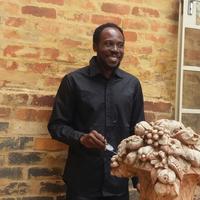Papers by Omowumi Ogunyemi
Responsible Management in Africa, 2022
This is one of the broadest collection of essays on Responsible Management in Africa that I have ... more This is one of the broadest collection of essays on Responsible Management in Africa that I have come across. Reading this book will open your eyes to African grounded knowledge that has been suppressed. As we say in West Africa-it will 'shine your eyes'. The book should be compulsory reading for all students of sustainability and responsible business around the globe.
Responsible Management in Africa delivers a rich reservoir of indigenous value-narratives based on a well-balanced philosophical anthropology, enriching global knowledge in the philosophy of management and in business ethics and contributing much-needed insights for leaders around the world to manage enterprise responsibly.
Responsible Management in Africa Volume 1, 2022
Responsible Management in Africa delivers a rich reservoir of indigenous value-narratives based o... more Responsible Management in Africa delivers a rich reservoir of indigenous value-narratives based on a well-balanced philosophical anthropology, enriching global knowledge in the philosophy of management and in business ethics and contributing much-needed insights for leaders around the world to manage enterprise responsibly.
Imprint: Emerald Publishing Limited
Format: Hardback
ISBN: 9781802624380
African Virtue Ethics Traditions for Business and Management, 2020

Authentic leadership is a commonly used term; however, its significance and merits may not be ful... more Authentic leadership is a commonly used term; however, its significance and merits may not be fully grasped without paused reflection. Authentic leaders are true to the self and true to the values that they hold dear. They transmit those values to their followers. Those values are not arbitrary inventions or personal interests, but they are the core values that enable both leaders and followers to find meaning in their activities and to reach their goals. This chapter explores the concept of authentic leadership, highlighting its characteristics and the role it plays in the development of organisations. Authentic leadership fosters the growth of firms by giving meaning, core values and purpose to all who work there, thus empowering them to exercise their creativity in attaining their own fulfilment in a way that is compatible with the firm’s development. Authentic leadership thus differs from self-satisfaction and self-affirmation. It involves a sincere concern for the integral well...

Forum: Supplement to Acta Philosophica, 2019
Classical philosophy and contemporary neuroscience recognize that chronic human pain involves con... more Classical philosophy and contemporary neuroscience recognize that chronic human pain involves conscious experience, emotional reactions, and physical sensations. With the advent of advanced imaging in pain research, corporeal and nervous system involvement in chronic pain are now better understood. Consequently many scholars today see pain as a combination of micro-processes rather than a simple event. This bottom-up vision of human pain explains it through a combination of its objective and subjective elements. Chronic human pain, which is pain that lasts for more than three months or persists without reason following acute pain, goes beyond consciousness, emotional reactions , and physical sensations. Its subject is urgently moved to seek meaning and ful lment. That search, while involving cortical and other bodily processes, is not limited to these. Narrative self-understanding and autobiographical thinking takes into account the faculties of intellect and will and can situate pain within a broader context of a meaningful life story. In this way, a top-down approach is adopted. The micro-processes involved in a painful event are thus integrated into the understanding of the self. One's experiences and how one narratively understands pain and its place in life can contribute to the debate on the union between the body and soul. This article contributes to that debate by exploring the role of narratives and autobiography in chronic pain while seeking to understand corporeal and psychical unity and cooperation in the human's quest for wellbeing and ful lment.
S. Dhiman (ed.), The Palgrave Handbook of Workplace Well-Being,, 2020

Pensando il Lavoro, 2018
"Through work, man must earn his daily bread and contribute to the continual advance of science a... more "Through work, man must earn his daily bread and contribute to the continual advance of science and technology and, above all, to elevating unceasingly the cultural and moral level of the society within which he lives in community with those who belong to the same family." With the above opening statement of the encyclical Laborem Excercens, Pope John Paull II highlights the importance of work to the human being. Further on in the document, he describes two dimensions of work: an objective sense (technology) and secondly, work in a subjective sense (the human being as the subject of work). A concern for the psychological wellbeing of the human being at work is an important theme in contemporary debates. Psychology has its roots in ancient philosophy and was often linked to theology and a desire for great things beyond personal satisfaction. The split between the psychological inquiry and philosophy in the nineteenth century was followed by a development of psychology as an empirical science often times independent of anthropology and philosophy in general. Additionally, with time, it focussed more on pathologies and their remedies. Today, many psychologists seek to understand psychological health in order to promote and explain work and the enjoyment of work in our world. There is also a humanistic tendency in some subspecialties of contemporary psychology. Many of the humanistic trends in contemporary psychology however have lost touch with classical philosophy and theology. Scholars engaged in the quest of understanding normal psychology often come up with explanations which partly respond to the needs and desires of the human being. An example of such is the contributions of positive psychology to the psychology of work. Themes like flow, character strengths and signatures are common terms in that psychology. These concepts can be enriched and fit into a more robust anthropological framework without undermining the scientific authority and autonomy of psychology. For example, the studies which focus on optimal experiences, flow, at work may be enriched with a more stable motivation for work or a stronger source of fulfillment and enjoyment at work such as the concept of generativity taken from narrative psychology. Generativity is a concern for people besides self and family that usually develops during middle age; a need to nurture and guide younger people and contribute to the next

Narrative self understanding is becoming more prominent as a field of research in human behaviour... more Narrative self understanding is becoming more prominent as a field of research in human behaviour, and is particularly interesting for business ethicists who wish to look into behavioural ethics. The way a person possesses his own story can affect his perception of others and his understanding of what is due to them from him. It can therefore affect his capacity to treat them with justice and fairness. This paper looks at the self narratives of twenty subjects vis-à-vis their perceptions of a common event (as a proxy of their judgements of others which therefore would influence their relations with others). It thus uses a qualitative method of textual analysis to examine the relationship between the way a person perceives and describes himself or herself and the way he or she perceives others. The study throws light on an important aspect that needs to be included in curricula of managerial anthropology and of business ethics.
Narratives are important from cultural and historical perspectives. Oral transmission of values i... more Narratives are important from cultural and historical perspectives. Oral transmission of values in African traditions through storytelling is a well-known example of the use of narratives to express historical events and other important ideas like moral values, beliefs in divinities, the origin of human existence the meaning of life, and the importance of virtues to living a fulfilled human life. Today in many fields, narratives are seen as important for self -understanding. This paper explores different perspectives of the self and narrativity.
Thesis Chapters by Omowumi Ogunyemi

SERIES PHILOSOPHICA -XLVII DISSERTATIONES SERIES PHILOSOPHICA -XLVII , 2017
The short title of this work: Autobiography, Time, and Narrative in Philosophy and Psychology, ex... more The short title of this work: Autobiography, Time, and Narrative in Philosophy and Psychology, expresses the principal topics discussed. The temporal dispersion of an individual's actions throughout life, makes their unification and stability in purpose challenging, as such temporal separation of human actions makes it difficult to view the effects and significance of particular acts, and their long-term impact. Fortunately, narrative self-understanding and autobiographical thinking in orienting the whole human life, resolves the challenge posed by temporal dispersion. In this work, Ogunyemi explores the relationship between the anthropological theories of the dynamics of temporality with narrative self-understanding that are developed from an Aristotelian and Thomistic philosophy, and recent theories in psychology and neurosciences, through her reading and interpretation of contemporary authors. She presents scientific observations related to habit formation and self-improvements that are congruent with philosophy. MacIntyre as well as other philosophers often analyzed the validity of psychology's methods and frameworks and Ogunyemi contributes to this dialogue by pointing out similarities between autobiographical temporality seen in disparate fields. She explores concepts of narrative philosophy from the first-person perspective, and makes a synthesis of elements of autobiographical temporality which could form an anthro-pological framework for observations made from research in different subspecialties of contemporary psychology and neurosciences. Her interdisciplinary approach highlights prospects of mutual enrichment between different fields. The need for interdisciplinary studies, such as this one, is ever increasing and urgent since the development of particular sciences, that promote human flourishing today, requires a deeper understanding of the human being in his totality. Omowumi Ogunyemi obtained her first degree in medicine and surgery. She has worked as a medical practitioner in various hospitals in Nigeria including The Federal Neuro-Psychiatric Hospital, Lagos, where she managed patients with substance induced disorders. She holds a licentiate degree and a doctorate in philosophy from the Pontifical University of the Holy Cross, Rome.
Books by Omowumi Ogunyemi
Humanistic perspectives in hospitality and tourism, 2022










Uploads
Papers by Omowumi Ogunyemi
Responsible Management in Africa delivers a rich reservoir of indigenous value-narratives based on a well-balanced philosophical anthropology, enriching global knowledge in the philosophy of management and in business ethics and contributing much-needed insights for leaders around the world to manage enterprise responsibly.
Imprint: Emerald Publishing Limited
Format: Hardback
ISBN: 9781802624380
Thesis Chapters by Omowumi Ogunyemi
Books by Omowumi Ogunyemi
Responsible Management in Africa delivers a rich reservoir of indigenous value-narratives based on a well-balanced philosophical anthropology, enriching global knowledge in the philosophy of management and in business ethics and contributing much-needed insights for leaders around the world to manage enterprise responsibly.
Imprint: Emerald Publishing Limited
Format: Hardback
ISBN: 9781802624380